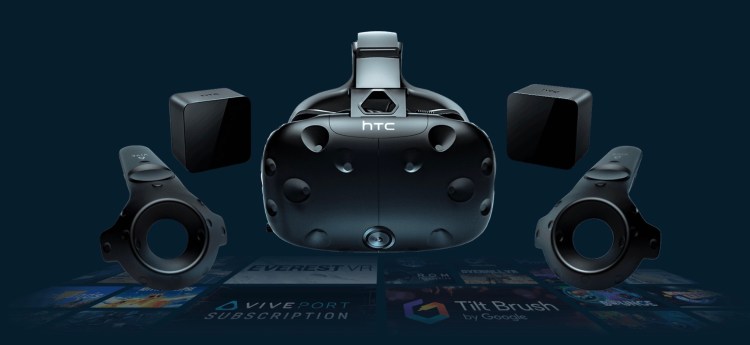Virtual reality headsets have faced gloomy forecasts since shortly after they hit the market, so one of the industry’s leaders decided today to directly address the naysayers. A blog post from HTC’s Vive team says that “news of the so-called death of VR comes once a year and is greatly exaggerated,” then rebuts the claims with a surprising new detail: Vive headsets recently sold out while experiencing record-breaking sales.
HTC was provoked to respond by a report that circulated two weeks ago, headlined with the claim that “consumer interest in VR appears to be declining” based on Amazon sales rank data. Though we received the report, we didn’t cover it because the supporting data struck us as too thin to support its theory. For instance, the report’s sole HTC-focused chart showed the original headset’s sales declining in June after noticeably picking up in late April.
As it turns out, the reason for the decline was that HTC completely sold out of the charted model. “Vive has paced at its highest sales velocity of all time, for weeks on end,” the company says, “and we sold out. For a consumer electronic product in its third calendar year, this continued trajectory is nearly unheard of.” So rather than the decline prompting the company to discontinue the original Vive, HTC is now increasing the headset’s production so it can restock stores.
The good news isn’t solely limited to the original Vive headset, either. HTC also cited IDC and Canalys research showing that it was the industry’s revenue leader in the first quarter of 2018 with a 35.7 percent market share, and had the top-selling standalone VR headset in China during the same period. Without getting into the rapidly increasing popularity of VR in China, HTC also pointed out that three of China’s top four all-in-one VR headsets run its WaveVR platform, including the number one-ranked Vive Focus, which is planned for global release this year.
That said, it’s easy to understand why observers would question HTC’s outlook. The company has recently suffered multiple rounds of layoffs, the sale of its third-party smartphone development division, and ongoing criticism over its comparatively high VR device pricing. HTC concedes in its blog post that “major players have not released sales figures to substantiate the market momentum” that premium VR headsets are apparently seeing, and this post doesn’t provide hard numbers, either.
But HTC’s message is pretty clear: VR is at the beginning of its life cycle, so strap in for the longer ride. If you’re looking to quantify its success today, Amazon sales charts are only a small piece of the big picture: The variety, quality, and performance of devices are increasing; business purchases for location-based VR and training are picking up; and consumers are acclimating to the new technology. VR will take time to get established, but it’s heading in the right direction.

